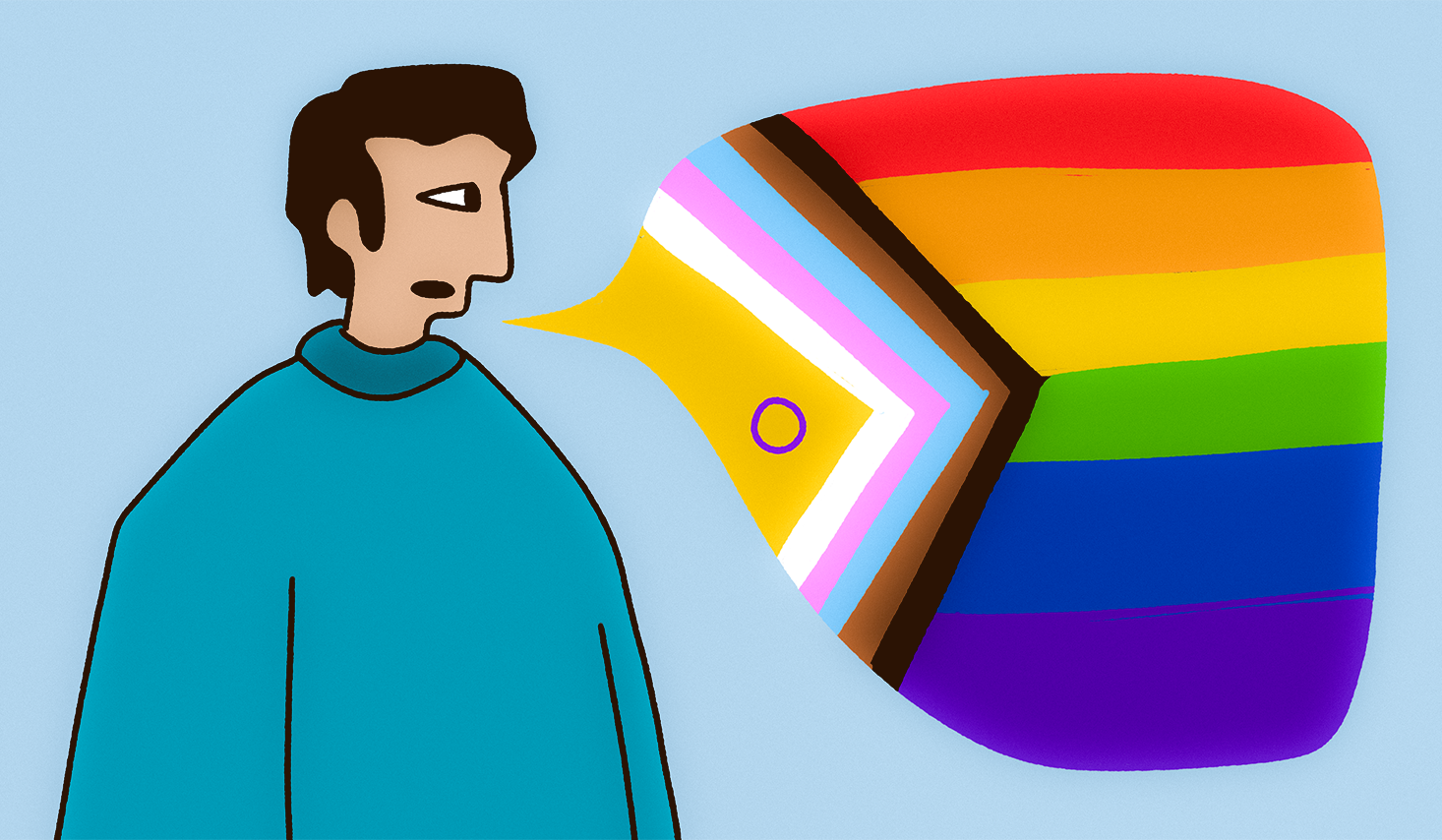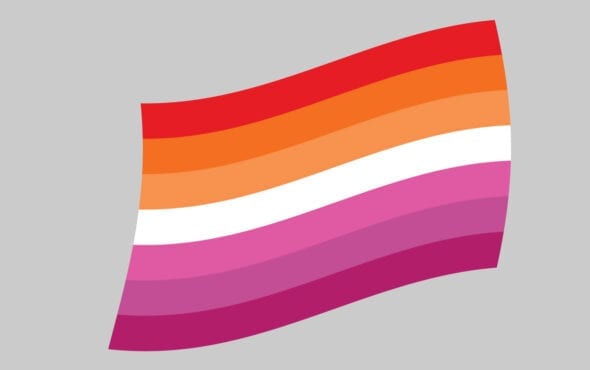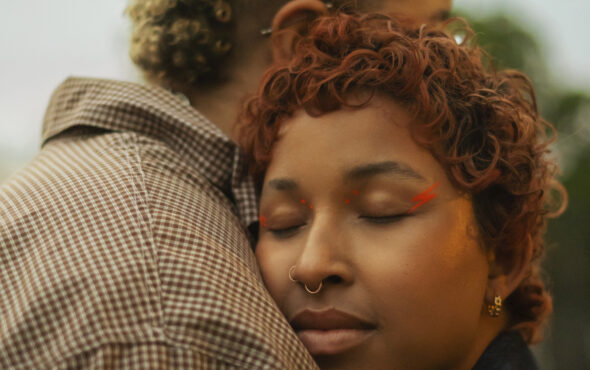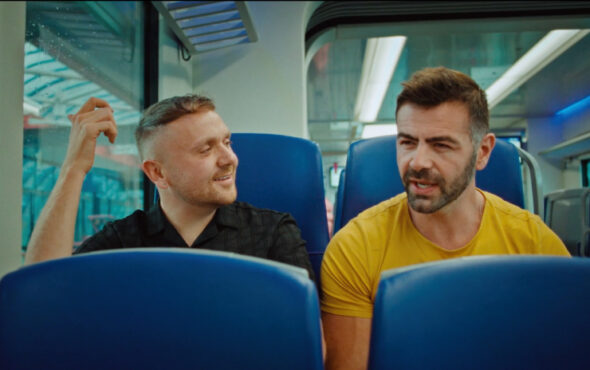
In another week of LGBTQIA+ on-goings, the internet has, yet again, struck up a fresh new debate. Following the appointment of Gabriel Attal, France’s youngest-ever PM, a conversation has opened up online about the phrase “openly gay”.
We’re never short of online discourse but this conversation seems to have something to it. Language is, understandably, pertinent to the queer experience — words affect how we present ourselves and perceive others. For many of us, the commonly used binary of being either out or closeted is not reflective of our reality. Our choice of language is vital for how we choose to convey our identity, whether in public or private. For some, as Andrew Scott recently criticised, we would never use the term “openly gay” in a conversation. However, others have argued the term could be a helpful distinction as not everyone has the luxury of just being out: what if you’re comfortable being out with your friends but not in your workplace?
So, where do you stand on the phrase? Two writers go head to head to debate the term.
AGAINST [NICK LEVINE]
New year, same old reductive coverage of queerness in the mainstream media. When Gabriel Attal was announced as the new Prime Minister of France this week, publications including the New York Times, CNN and the BBC called him the first “openly gay” person to hold the position. While these outlets were right to draw attention to the historic nature of Attal’s appointment – he is only the ninth out LGBTQ+ person globally to serve as a head of state or government – their choice of language was bitterly disappointing. To label someone “openly gay” in 2024 isn’t just anachronistic; it also carries the stale whiff of stigma.
Irish actor Andrew Scott made this point strikingly during a recent roundtable hosted by The Hollywood Reporter. “I’m going to make a pitch for getting rid of the expression ‘openly gay’,” he told a panel of actors that included Robert Downey Jr., Mark Ruffalo and Colman Domingo – the latter, like Scott, is an out gay man, “It’s an expression that we only ever hear in the media,” Scott continued. “You are never at a party and say: ‘This is my openly gay friend.’ You never say it. Why do we put ‘openly’ in front of that adjective? You don’t say you’re openly Irish, you don’t say you’re openly left-handed.”
“You are never at a party and say: ‘This is my openly gay friend.’ You never say it. Why do we put ‘openly’ in front of that adjective?”
Scott then went further, pointing out that “openly gay” comes loaded with a subtle sense of judgement. “There’s something in it that’s a little near ‘shamelessly’. You’re open about it? I’d nearly prefer shamelessly,” he said. Scott is absolutely right: the phrase “openly gay” is a sad hangover from a time when discussions of queerness in the media tended to be tacitly or even overtly disapproving. “Openly gay” feels a little like a rebuke from a homophobic relative: “We know you’re gay, but do you have to keep rubbing it in our faces?”
Generally, progress has been made since the early noughties, when it wasn’t uncommon to read about people in the public eye “admitting” to being LGBTQIA+. Back then, some British tabloid newspapers viewed closeted pop stars as scoop material. Shortly after he won the talent show Pop Idol in 2002, Will Young learned that a tabloid was planning to “out” him, at 23, as gay. Recalling the difficult decision he had to make at the time, Young said in 2022: “Homophobia was still happening to me in public. It was a real patriarchal system run by straight white guys, so it was rife in the media, in the music industry.”
Thankfully, tabloid “outing” is now seen as completely unacceptable. In 2022, the Sydney Morning Herald was criticised when it emerged that Rebel Wilson had gone public about her relationship with Ramona Agruma because a columnist was planning to write about it. Outlets have become careful about the language they use to describe coming out – we don’t expect to read about someone “revealing” or “confirming” that they’re a member of the LGBTQIA+ community. Instead, coming out stories tend to be framed as someone “sharing” or “telling fans” about their gender and/or sexuality.
Hopefully one day it won’t be considered “news” when someone with a public-facing job speaks about being LGBTQ+. As writer Damian Barr pointed out this week on X, formerly Twitter, “the phrase ‘openly gay’ wouldn‘t be necessary if we didn’t live in a world where everyone was assumed to be straight”. But until then, our choice of language matters. At best, “openly gay” implies an act of bravery: it suggests that coming out is a risk someone has weighed up and deemed to be worth taking.
Our choice of language matters. At best, “openly gay” implies an act of bravery: it suggests that coming out is a risk someone has weighed up and deemed to be worth taking.
Sadly, in many parts of the world, coming out really is a risk – not just to a person’s public image, but also to their personal safety. But this doesn’t mean “openly gay” should be attached to Gabriel Attal, a successful politician in a relatively liberal Western country. According to a 2023 poll, 84% of people in France agree with the statement: “There is nothing wrong in a sexual relationship between two persons of the same sex.”
In most cases, simply describing someone as “gay” or “LGBTQ+” does the job. When we want to celebrate someone for being the “first” in a certain role, “out gay” or “out LGBTQ+” is a solid compromise: it means we don’t inadvertently erase someone from a previous generation who never spoke publicly about their gender and/or sexuality. The LGBTQ+ community has worked hard and is still working hard to gain equal rights and greater acceptance. We don’t deserve to have that progress undermined by a lazy phrase that harks back to less enlightened times. So, “openly gay” is out in 2024 – just “gay” is in.
FOR [JORDAN PAGE]
Queerness is made up of layers. For some of us, these may be few and far between as we feel empowered, assured and safe to share this part of our identity freely. For others, it’s complex. Whether it’s cultural or religious pressures, outright bigotry or fear for our safety, deciding when and where we disclose our sexuality and gender identity – and to whom – can be an exhausting task. Now, more than ever, language is one of the most important tools for LGBTQIA+ people to navigate this process.
While language is important, so is context – especially when it comes to referring to someone as “openly gay”. Say we’re talking about one of our friends to another – it’d feel redundant to describe them in such a way, right? But when it comes to, say, the reporting on the appointment of Gabriel Attal, the phrase feels natural. Why? It’s not about shame, guilt or embarrassment – I’d argue that it’s loaded with a historical sense of both recognition and respect.
Whether a politician, sportsperson, or musician, referring to someone as the “first openly gay” figure recognises an undeniable milestone for the LGBTQIA+ community. History may be plagued with the suppression of queer voices and experiences, but to an extent, so is the world we’re in today. Although the “more accepting” country you live in may appear lightyears away from those where homosexuality is illegal – or even punishable by death – the statistics don’t lie: queer people still face discrimination and violence daily across the world. With a legacy of feeling suppressed, or closeted, why shouldn’t we take every opportunity to celebrate being “open”?
Not only that, but affixing “openly” before denoting someone’s sexuality is a marker of respect. Why? The distinction nods to the fact that throughout time, LGBTQIA+ people have held important positions, broken records and made important contributions to the world. Using “openly” doesn’t erase these achievements, instead, it honours them. As people on X, formerly Twitter, have noted regarding Attal, it “simply means the media can say he’s the first gay PM without knowing the inner thoughts of every previous one”.
We’ve grown to encourage each other to use the terms that we feel reflect ourselves most accurately – who are we to judge and dictate other people’s self-expression?
As time evolves, so does language. Just because now some feel that “openly” isn’t needed, let’s not forget the older generations of queer people – many of whom will still be reading these headlines – who fought to be seen, to be heard, and who have earned the right to use the terms and phrases of their choosing to describe how they operate in a heteronormative society. Much like our sexuality and gender identity, the words we use to describe these facets of our identities are just as personal. We’ve grown to encourage each other to use the terms that we feel reflect ourselves most accurately – who are we to judge and dictate other people’s self-expression?
Yes, in some ways, the society we live in today is improving its treatment, acceptance and representation of LGBTQIA+ identities. But holistically, society is still pretty straight. Whether we like it or not, it’s this world that the very headlines in question cater to. There are still plenty more of these firsts, like Gabriel Attal, that will – and need – to happen. But with dangerous legislation, hate crimes and complete erasure facing our community at all angles, is fueling further division between us, over something ultimately positive, really the hill we want to die on?


